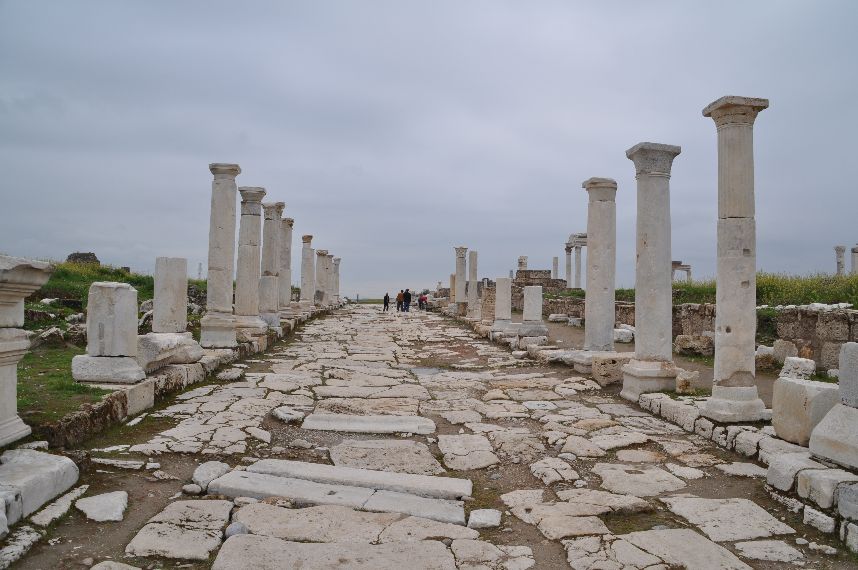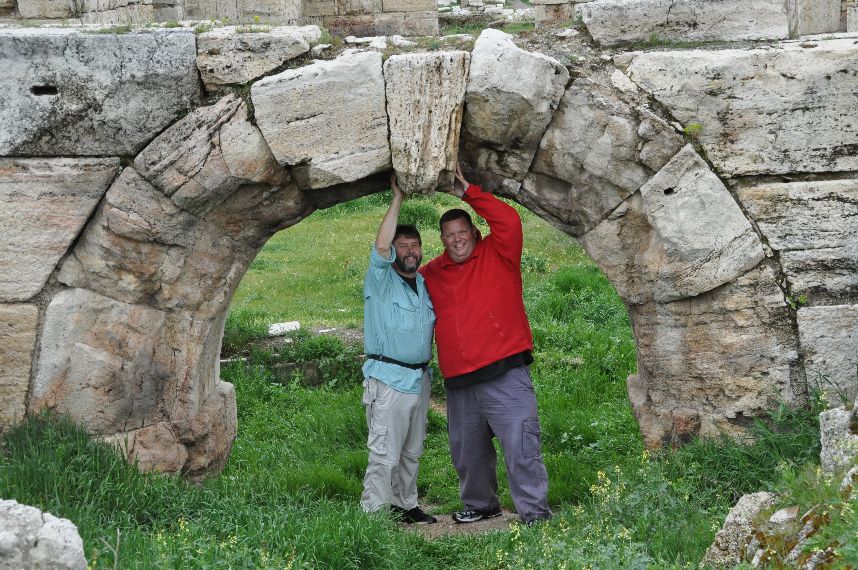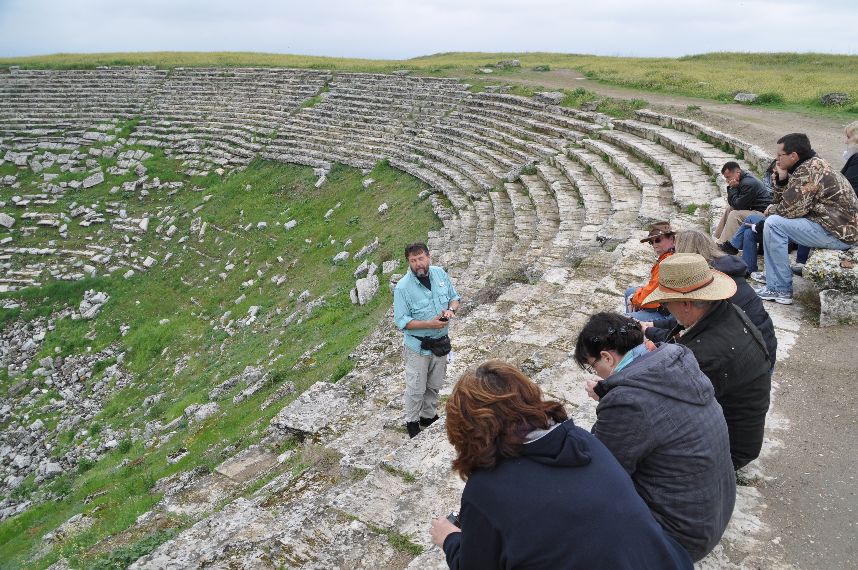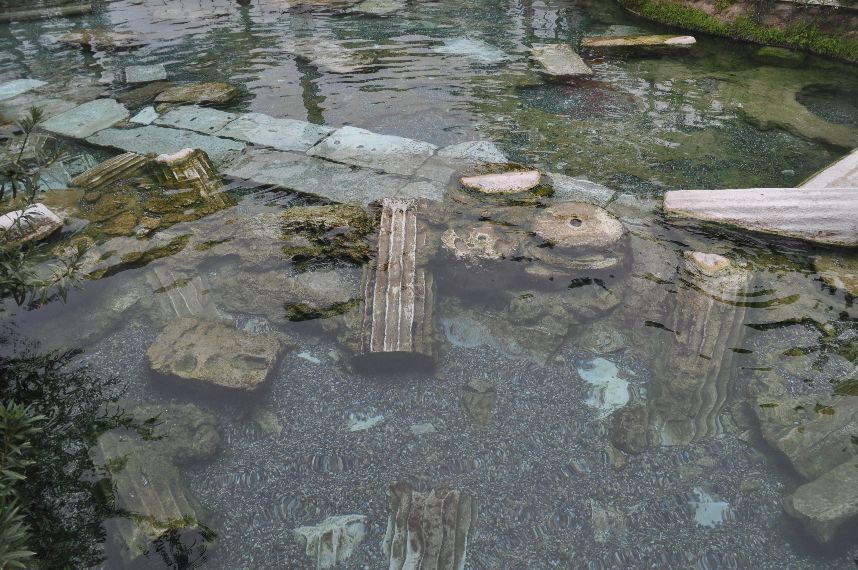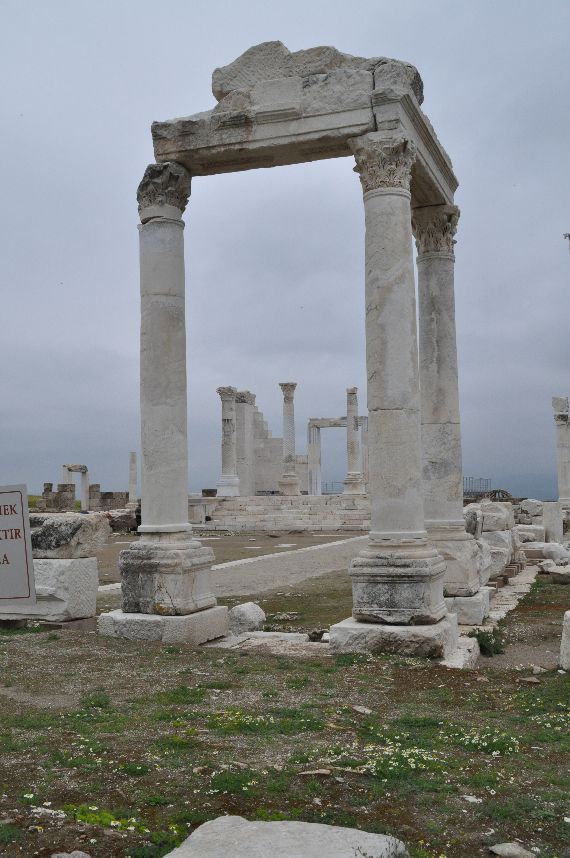To the Church in Laodicea
14 “To the angel of the church in Laodicea write:
These are the words of the Amen, the faithful and true witness, the ruler of God’s creation. 15 I know your deeds, that you are neither cold nor hot. I wish you were either one or the other! 16 So, because you are lukewarm—neither hot nor cold—I am about to spit you out of my mouth. 17 You say, ‘I am rich; I have acquired wealth and do not need a thing.’ But you do not realize that you are wretched, pitiful, poor, blind and naked. 18 I counsel you to buy from me gold refined in the fire, so you can become rich; and white clothes to wear, so you can cover your shameful nakedness; and salve to put on your eyes, so you can see.
19 Those whom I love I rebuke and discipline. So be earnest, and repent. 20 Here I am! I stand at the door and knock. If anyone hears my voice and opens the door, I will come in and eat with him, and he with me.
21 To him who overcomes, I will give the right to sit with me on my throne, just as I overcame and sat down with my Father on his throne. 22 He who has an ear, let him hear what the Spirit says to the churches.” (Revelation 3:7-13)
About the city of Laodicea:
Laodicea is a hill city (acropolis) which sits between two other important cities as well. To the north is Hierapolis which is a city which was built upon a thermal hot spring. It is famous for its medicinal qualities because of all the minerals in the water. The water which flows from this city’s springs are boiling hot! To the south is the city of Colossae which the book of Colossians was written too. It is a smaller city, but an important agricultural area. Next to the city of Colossae is a stream which flows from a mountain spring. The waters here are exceptionally cold. Laodicea sits in between the two cities, one hot, one cold. The water source in Laodicea is not a clean water source. Indeed, the water which flowed to this city was lukewarm and reddish color.
Because of the location of this city it was an important strategic command center for the region. It was wealthy city which was famous for black wool from its black sheep. This was rarer than white wool. Because of the location of the city as a major trading post and its marketing of various products this was a very wealthy city. Apparently, this wealth was even enjoyed by Christians in the area.
The city has two amphitheatres, one which can seat a few thousand and a larger one which can seat more than 10,000 people.
About the prophecy to the church in Laodicea:
As typical, in the prophecies to the church, Jesus first speaks to them by announcing something about himself. He announces, “These are the words of the Amen, the faithful and true witness, the ruler of God’s creation” (Revelation 3:14). He announces himself as the “Amen”. Amen is Hebrew word which has at its root “to stand firm, steady, and trustworthy”. Amen is also a title which is used of God to refer to himself which identifies him as “the God of Truth”. He then announces that he is “the faithful and true witness”. While Amen is a Hebrew word, his description of “faithful and true witness” was in Greek to translate “Amen” to the Greek speaking audience as well. By saying this he is announcing his character. He is always faithful and does what he promises and speaks the truth always.
Finally he announces that he is “the ruler of God’s creation”. In a place like Laodicea and the surrounding area, people had built elaborate temples on natural phenomena. Just nearby in Hierapolis, the location of a massive hot spring, the people had built a temple to Apollo (the God of the underworld). Even in Laodicea, temples to various gods covered the acropolis (mountain fortress) and these gods were supposed to be controllers of various parts of nature. Jesus, however, announced that he was the sole “ruler of God’s creation”, declaring himself as supreme. It is likely that the church in Laodicea had syncretized their Christian faith with the ritual worship of other gods which were patrons to Laodicea.
In one of the harshest criticisms to the church Jesus says, “I know your deeds, that you are neither cold nor hot. I wish you were either one or the other!” (Revelation 3:15) Jesus says, “I know your deeds”, yet the word “deeds” among protestants is nearly a swear word. Ever since Martin Luther declared correctly that “Salvation is by faith alone”, it seems the followers of the Lutheran protest have been against all “deeds” ever since. Yet, clearly, Jesus will and does see our works and evaluates us based on our works too. (See also 2 Corinthians 5:10) Yes, our salvation is a free gift, but our Christian life is demonstrated and lived out by what we do. Jesus condemns the church of Laodicea for deeds which were neither “hot nor cold” or you could say they did nothing special. The “hot or cold” metaphor would clearly have been very well understood being that they could see the hot springs of Hierapolis and frigid cold river of Colossae from their city.
Then Jesus gives a judgment to the city. He says, “So, because you are lukewarm—neither hot nor cold—I am about to spit you out of my mouth” (Revelation 3:16). He does not tell them he is giving them time to repent, nor warning them to change their ways. It is as if they are too far gone! Therefore, Jesus says, because they are “lukewarm” he is going to “spit them out of my mouth”. Knowing the history of Laodicea, it is clear that Jesus did destroy them. The city was completely destroyed in the first century and every subsequent rebuilding was also destroyed by earthquakes. In 60 AD the entire city was destroyed by earthquakes, but the people decided to rebuild. There were major destructive earthquakes from 100 AD until 600 AD every fifty to one hundred years until they eventually abandoned the site completely in the seventh century. Only in the last few years are they attempting to rebuild the ruins of city again. . . they might want to be careful, it seems God has repeatedly destroyed in for a reason!
But it is as if he knows Laodicea will give excuses to him for their actions. So Jesus gives their excuse and counters it by saying, “17 You say, ‘I am rich; I have acquired wealth and do not need a thing.’ But you do not realize that you are wretched, pitiful, poor, blind and naked. 18 I counsel you to buy from me gold refined in the fire, so you can become rich; and white clothes to wear, so you can cover your shameful nakedness; and salve to put on your eyes, so you can see” (Revelation 3:17-18). The largest city in the region used to be Colossae, but Laodicea quickly surpassed it growing in great with wealth. In their wealth they felt invincible and important. Yet, in the spiritual, God viewed them very differently. He viewed them as “wretched, pitiful, poor, blind and naked.” That is not how anyone from Laodicea, or the ancient world would have described this magnificent city. The city was known for its wealth, but Jesus said they should “buy gold from him refined in the fire”. They were known for expensive black wools and garments (still famous to this day in Turkey), but Jesus said they should buy from him “white clothes to wear, so they can cover their shameful nakedness”. Clearly, white in the Bible is always a reference to holiness and purity. Finally, the city was known for its medical care, along with Hierapolis nearby, but Jesus told them they should get “salve to put on their eyes, so they can see!” This was a “church” which was all about itself. The people were wealthy, yet poor spiritually. The city for which the church was in was famous for its fine garments, but spiritually they were naked. While their medical care was top-notch for their century, they were blind spiritually. No one wants to be associated with Laodicea today, but honestly, Laodicea was a predecessor of many modern “churches” we find today which are caught up into materialism and member programs, yet make little to no difference in the communities to which they live.
One of the most famous passages of scripture in the Bible is “20 Here I am! I stand at the door and knock. If anyone hears my voice and opens the door, I will come in and eat with him, and he with me” (Revelation 3:20). This verse has been used in countless invitations to salvation in Christ. Yet, the verse is not talking about salvation. Jesus is talking to believers.
The previous verse, 19, sheds more light on the context of this verse. It says, “19 Those whom I love I rebuke and discipline. So be earnest, and repent”(Revelation 3:19). Jesus is saying that these Christians have become complacent and lazy in their own wealth. They have drifted away from God, yet are still “Christians”. Jesus is warning them to repent quickly! He promises those who hear him, he will fellowship with them. Therefore, he is saying that he is not in fellowship with the church in Laodicea. Jesus was calling to them, and hoping that they would open the door and invite Jesus into their church!! Wow. What a shocking statement.
What is means for believers today:
Every church today needs to be concerned they are not following the path of Laodicea. Jesus warned them, “I know your deeds, that you are neither cold nor hot. I wish you were either one or the other!” (Revelation 3:15) Christ is looking at our deeds today also. The same Jesus that prophesied to the church in Laodicea also said, “47 “That servant who knows his master’s will and does not get ready or does not do what his master wants will be beaten with many blows. 48 But the one who does not know and does things deserving punishment will be beaten with few blows. From everyone who has been given much, much will be demanded; and from the one who has been entrusted with much, much more will be asked” (Luke 12:47-48). Again, Jesus is speaking of “words” and “deeds”. Most importantly, he says “who has been given much, much will be demanded; and from the one who has been entrusted with much, much more will be asked.” A wealthy group of believers is going to be expected by Jesus to “do” more. Laodicea had become complacent in their living out the Christian life, but they became comfortable in their wealth. They were wealthy, but God was not present with them. What a tragedy!
The message to the church today is very clear: It matters how you live your life. It matters to Jesus. If you have been given much, you are responsible to do more. Yes, you need to “do” (live out your faith). “Work” and “deeds” seem almost like bad words in most protestant churches. That is very sad. We become content to listening to weekly speeches and discussions on theology in the modern Christian life, but few believers are involved in ministry. It was Jesus’ design that every believer would be doing ministry (service). Many believers have lost that. They are lukewarm.
To the church in the West, but across the Christian world in general I believe the Lord is saying, “20 Here I am! I stand at the door and knock. If anyone hears my voice and opens the door, I will come in and eat with him, and he with me” (Revelation 3:20). It is not a call to salvation, per se, but a call to bring Jesus back into the church! What? How could that be? After all most good Christians dedicate 90 minutes of their week to him every Sunday morning! It seems many churches have become complacent. They no longer seek the Holy Spirit’s guidance. They have their traditions/programs to maintain. This famous verse, “Here I am! I stand at the door and knock. . .” is addressed to church members! Most preachers get the context of this verse wrong, it is not asking for people to get saved, it is asking for believers to allow Jesus into their hearts and churches! Wow!
As is the affirmation to all other seven churches Jesus said, “To him who overcomes, I will give the right to sit with me on my throne, just as I overcame and sat down with my Father on his throne.” (Revelation 3:21) Jesus lived an overcoming life. He performed miracles, he taught, he served others. He died for all of our sins, yet he conquered death. He lived a perfect life. He did so many great deeds! He overcame! In the same way, we need to overcome as well.
